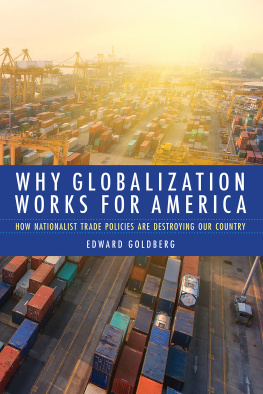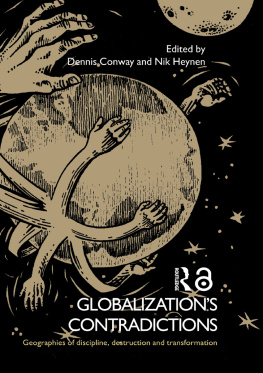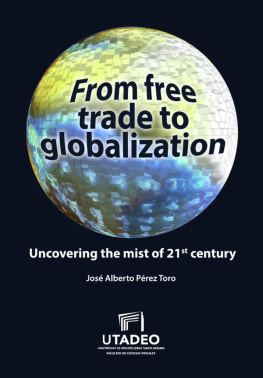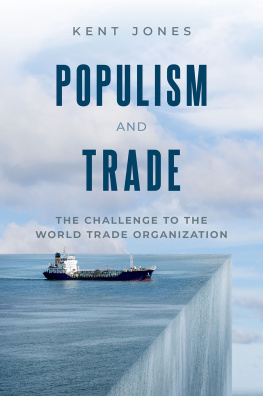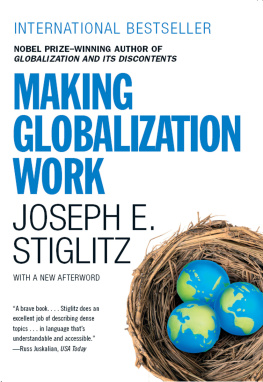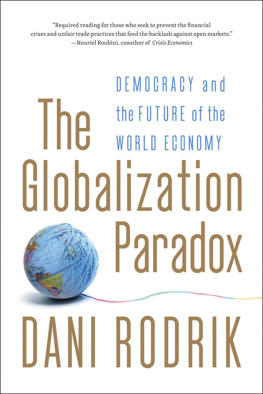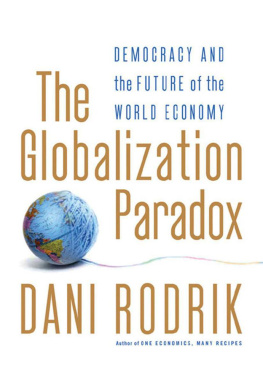
A richly detailed, clear-eyed examination of how America arrived at this odd moment in history and what truly makes the U.S. economy great. Goldbergs chapter on the disastrous history of trade tariffs should be required reading for everyone working on trade policy in DC . An approachable, sophisticated examination of the problems ailing America and the political myopia that led to them.
Heather Timmons, economics editor for Reuters
This book offers an outstanding overview of a complex subject by placing a pro-globalization thesis within a broader historical framework.... This work should have cross-party and cross-disciplinary appeal.
Irene E . Finel-Honigman, coauthor of International Banking for a New Century
A powerful defense of economic globalization and an indictment of the American political systems failure to adapt to its accelerating and inexorable advancea failure that has sparked a populist revolt by those left behind, threatening Americas global leadership and even our democracy.
William M . Leogrande, professor of government at American University
Why Globalization Works for America
How Nationalist Trade Policies Are Destroying Our Country
Edward Goldberg
Potomac Books
An imprint of the University of Nebraska Press
2020 by Edward Goldberg
Cover designed by University of Nebraska Press; cover image iStockphoto / wissanu01.
All rights reserved. Potomac Books is an imprint of the University of Nebraska Press.
Library of Congress Cataloging-in-Publication Data
Names: Goldberg, Edward, author.
Title: Why globalization works for America: how nationalist trade policies are destroying our country / Edward Goldberg.
Description: Lincoln: Potomac Books, an imprint of the University of Nebraska Press, [2020] | Includes index.
Identifiers: LCCN 2019032802
ISBN 9781640123014 (hardback)
ISBN 9781640123434 (epub)
ISBN 9781640123441 (mobi)
ISBN 9781640123458 (pdf)
Subjects: LCSH : GlobalizationEconomic aspectsUnited States. | NationalismEconomic aspectsUnited States. | United StatesCommercial policy. | United StatesForeign economic relations. | United StatesPolitics and government.
Classification: LCC HF 1455 . G 6496 2020 | DDC 382/.30973dc23
LC record available at https://lccn.loc.gov/2019032802
The publisher does not have any control over and does not assume any responsibility for author or third-party websites or their content.
To My Family
But closing the door to the world will not stop the evolution of the world.
Emmanuel Macron
Contents
Ironically I owe a debt of gratitude to Donald Trump and Bernie Sanders. During the 2016 campaign for the presidency of the United States, their never-ending simplistic attacks on globalization as well as Trumps actions after he was elected made me realize the need for a straightforward argument demonstrating how globalization benefits the United States. How nationalistic, isolationist-like trade policies, especially in the age of globalization, are extremely detrimental to our countrys economic health.
I also am grateful to my students at New York Universitys Center for Global Affairs. Every Thursday afternoon they challenge my ideas on globalization and its impact on American foreign policy and in the teaching process help me to clarify my thinking.
In addition I wanted to thank Thomas Quinn, who was a brilliant graduate student of mine at the Center for Global Affairs. Tom did an excellent job in assisting me on the research for the book.
I am very grateful to my agent, Carol Mann, of the Carol Mann Agency, whose encouragement, judgment, handholding, and persistence makes her all an author could wish a literary agent to be. I was also fortunate to have had a wonderful and knowledgeable editor, Tom Swanson, at Potomac Books. It was a pleasure to work with Tom and with his associates Abigail Stryker and Haley Mendlik. Wayne Larsens copyediting was very perceptive and precise.
I also need to thank Barbara Monteiro and Len Maniace of Monteiro and Company for their handholding and hard work throughout this project.
Last, I am so grateful to my wife, Barbara G. Saidel, for her steadfast support, honesty, wise counsel, and, most important, her love.
I am sure that the power of vested interests is vastly exaggerated compared with the gradual encroachment of ideas.
John Maynard Keynes
In my book The Joint Ventured Nation: Why America Needs a New Foreign Policy, I wrote about how Americas foreign policy needed to adjust to a globalized world, how the role of the United States in the international arena needs to evolve from that of indispensable nation to that of indispensable partnerand how America can remain first among equals in a joint ventured world.
Why Globalization Works for America is not about foreign policy; it is about the nine-hundred-pound gorilla named globalization that has reshaped the United States. It is about why globalization is here to stay, why America is the winner in the game of globalization, and why all the kings horses and all the kings men cant put the Humpty Dumpty of yesterdays nonglobalized world back together again.
This book is not about Donald Trump. It is about the tsunami of economic and cultural forces that swept Donald Trump into office. Whether Trump remains in office or not, he is merely a manifestation of the change-based economic discontent that will not rapidly dissipate when he leaves.
Globalization is a natural part of the human condition. It is the economic, political, and cultural version of evolution. Globalization is not a new phenomenon; it existed thousands and thousands of years before Tom Friedman wrote The World Is Flat. As the Israeli historian Yuval Noah Harari points out in Sapiens: A Brief History of Humankind, Cultures began swallowing and absorbing others from the earliest times of history.
Just look at the history of the tomato in Italy. The tomato, which is emblematic of Italian cuisine, is not Italian at all but Peruvian. Its arrival in Europe during the Renaissance defines globalization. The tomato originated in the Andes Mountains, traveled to Mexico, where it became part of Aztec cuisine, and was brought to Spain by the returning conquistadors in the 1500s. Shortly afterward it appeared in Italy, where it was reportedly first used by Cosimo de Medici not in a sauce but as an ornamental item. Because it was red, the Italians at that time would not eat it, believing it was the devils food. For its part, pastaanother defining dish of Italyappears to have originated in Greece and the Middle East, and was brought to Italy not by Marco Polo as the myth states but by Arab traders.
The United States is a child of globalization, born during one of globalizations earlier incarnations, the European Age of Discovery. Globalization is part of Americas DNA . To try to separate globalization from America would be like separating a child from its mother.
Long before the current term globalization became popular, the United States as a country defined the word. Founded by a mixture of cultureswhether British in New England, Dutch in New York, French in New Orleans, or Spanish in its Westthe United States then opened its doors in the mid to late nineteenth century to massive immigration from all over the world. In the second half of the twentieth century, the United States not only created the rules that allowed the current era of globalization to spread around the world; it also became the enforcer of those rules.
Next page
